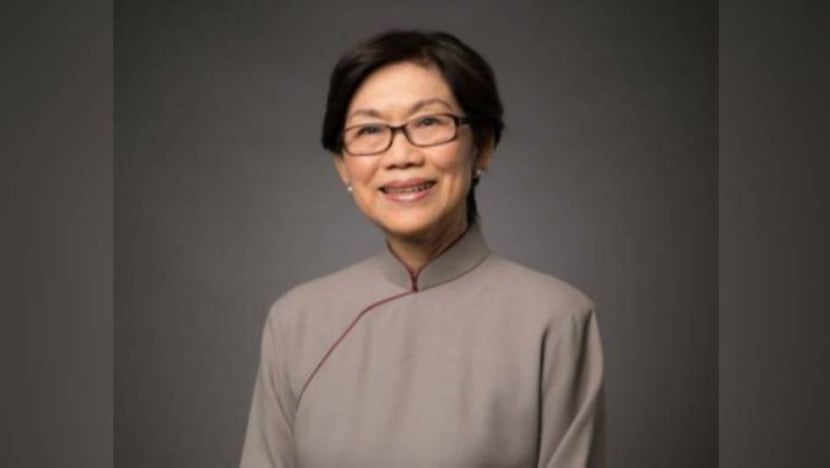'I was an accidental ambassador': Chan Heng Chee on being a female icon, the sacrifices she made and Singapore’s changing politics
Speaking about her new book World in Transition on the Heart of the Matter podcast, Professor Chan also touched on women in leadership, how Singapore society is changing and why governing is more challenging.

Ambassador Chan Heng Chee. (Photo: Yale-NUS College)
SINGAPORE: She was the first woman to graduate with first-class honours degree in political science from the then University of Singapore and Singapore’s first full-fledged female ambassador but Professor Chan Heng Chee says her achievements were unplanned and they came at a personal cost.
"If I tell people that I actually didn't plan on and worked for it in that way, you wouldn't believe it. But it's true. I keep saying I'm the accidental ambassador," said Prof Chan who was speaking on CNA’s The Heart of the Matter podcast recorded on Wednesday (Mar 17).
She was responding to a question from CNA’s Executive Editor Lin Suling, who asked her about her views on women in leadership and whether she had to make sacrifices to get to where she is today.
"I think later, did I pay a price? You know, I was ambassador to the United Nations. And it affected my marriage. And I got divorced. I think if you say, do women pay a price? I suppose I did.
"Frankly, it happens to a lot of women ambassadors. And it happens to male ambassadors now, too, I'm told, because sometimes there's a separation and distance," said Prof Chan who was formerly married to architect Tay Kheng Soon.
READ: Commentary: What’s wrong with being a single woman?
Drawing lessons from her own journey and expanding on personal trade-offs, Prof Chan said both men and women negotiating careers and family have to "decide how much of an ambition and goal you want to pursue, and how much you are prepared to go for it, and not have other things".
She put off having children on account of her work. "I always said, after the next book … If I had children, I would have paused and I would have brought up my children. I may not have become what I am today."
As the Government embarks on a review of women’s issues to engender a mindset shift on gender equality, Prof Chan says there’s still quite a lot of work to be done. Some men may not understand that their wives want a career and shared responsibilities at home.
Some women may not be supportive of their husbands’ careers either.
READ: Commentary: Goodbye to those days, when women were 'pieces of meat for men to slice'
"It is a conversation two people must have, two people in love. And two people who want to share a good life. It is not easy. I'm not sure there's a formula," said the 78-year-old.
Listen to the Chan Heng Chee’s full conversation on CNA's Heart of the Matter podcast:
RISING TO THE TOP
Prof Chan was inducted into Singapore Women’s Hall Of Fame in 2014 and was Her World’s first Woman of the Year in 1991.
What made it possible for her to rise to the top the way she did, in a time when it was not usual for women to do so?
She puts her success down to having the freedom to do what she wanted because her parents were open to their daughter trying new things so long as she was a "good girl and got good grades at school".
"I grew up at a time when there were far fewer constraints. I didn't have a Tiger Mum, I didn't have a helicopter mum or parents," said Prof Chan.
She went on to take on a variety of vacation jobs – writing for newspapers, working in an advertising agency and giving private tuition. One thing led to another and she found herself working in diplomacy where she says all her previous skills were put to excellent use.
Prof Chan was Singapore’s longest serving Ambassador to the United States, a position she helmed for 16 years, and before that, Singapore’s Permanent Representative to the United Nations.
A highly decorated and illustrious career saw her receiving the inaugural Asia Society Outstanding Diplomatic Achievement Award, the inaugural Foreign Policy Outstanding Diplomatic Achievement Award 2012 and the United States Navy Distinguished Public Service Award, after leaving her appointment in Washington.
Today, she serves as Ambassador-at-Large with the Ministry of Foreign Affairs and chairs the Lee Kuan Yew Centre for Innovative Cities in the Singapore University of Technology and Design.
READ: Review on women's issues goes beyond the law, aims to 'deeply ingrain' gender equality in society: Shanmugam
Asked about how women are seen in the workplace and whether negative stereotypes still exist, Prof Chan agreed there are different attitudes to women who are ambitious and want to do well.
"If men strive, it is good, he works very hard. And if a woman does the same thing, my goodness, she’s clawing … Unfortunately, that’s what women have to fight with. If she works and strives, some people say she’s too ambitious. If you don’t work and strive, your family members may say, hey, you’ve got a good degree, why aren’t you going out (to work)," she said.
2021 has been declared the Year of Celebrating SG Women and Prof Chan says her wish is that women help other women – for those at the top of the ladder to help others work their way up.
CHANGING SOCIETY AND POLITICS
In her book, Prof Chan talked at length about how Singapore society is changing and expanded on her idea of what she called "the youth bulge" in the 2020 General Elections.
The elections came at a time where Singapore is at its youth peak, with a sizable population bulge of young voters aged 25 to 44, her books highlights.
She describes this group as tech-savvy, socially conscious voters who have a strong sense of fair play and justice.

On how this will affect governance, Prof Chan says it will make it harder because this generation are impacted by information they consume through the porous and borderless internet world.
"They will argue, and yes, they sound heated and intolerant … They want fairness, but you know, fairness for me, but I'm intolerant about your situation. It is not contradictory. This is human beings. And that's why the job of governing is so hard," she said.
This intensity of diverse views will mean that the 4G leadership has to find a way to reach out and find a consensus even if it is a big task.
READ: Social network sites, instant messaging most popular modes of political engagement in GE2020: IPS survey
"Creating consensus is much more difficult today, because everybody's reading something else. They have so many channels and sources of information."
Yet, the leader who stands out, says Prof Chan, is the one who is able to connect with people – someone with a human touch and who makes people feel that they are listened to and cared for, especially segments of the population who struggle because of the structural shifts from globalisation.
Despite the return of what she calls a "re-politicised" electorate where interests in diverse politics returns, Prof Chan’s assessment is that Singapore’s is still "gentle politics" compared to other parts of the world.
She believes the Singapore Government is doing a "good job of being inclusive" and has made a concerted effort to "put a floor to the bottom" so that people don’t "fall below a certain level".














